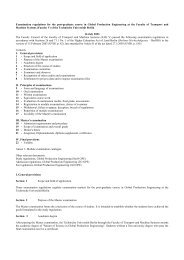Why BerlIn - Global Production Engineering - TU Berlin
Why BerlIn - Global Production Engineering - TU Berlin
Why BerlIn - Global Production Engineering - TU Berlin
You also want an ePaper? Increase the reach of your titles
YUMPU automatically turns print PDFs into web optimized ePapers that Google loves.
university began in 1933. The <strong>Berlin</strong> Technical<br />
College had become a center of Nazi activity,<br />
especially – but not exclusively – among<br />
the student body. In April 1946, with the<br />
support of the British military government in<br />
<strong>Berlin</strong>, the university re-opened its doors. A<br />
conscious decision was made not to simply<br />
re-open the Technical College, but to open a<br />
new university under a new name, the Technische<br />
Universität <strong>Berlin</strong>. The result was the<br />
creation of Germany’s first “technical university.”<br />
In an attempt to redefine the educational<br />
goals of the university, all students were<br />
required to include courses in the humanities<br />
as part of their studies, the intention being to<br />
broaden students’ horizons.<br />
Today, the university offers a broad range of<br />
courses in the humanities and social sciences.<br />
The incorporation of the <strong>Berlin</strong> Pedagogic<br />
College has strengthened the role of the<br />
teaching profession at <strong>TU</strong> <strong>Berlin</strong>. As an engine<br />
for reform and invention reform legislation in<br />
the late 1960’s, <strong>TU</strong> <strong>Berlin</strong> brought fundamental<br />
changes to the internal organization of<br />
the university. The outdated structures of the<br />
traditional German university system were<br />
swept aside, and university members were given<br />
a greater role in shaping university policy.<br />
Twenty-one departments were established.<br />
A president replaced the traditional dean as<br />
head of a unified administration. University<br />
committees were made responsible for<br />
academic self-government. After a number of<br />
other changes, the number of departments<br />
fell to 15. In April 2001 these were again reorganized<br />
into seven faculties in order to<br />
21







